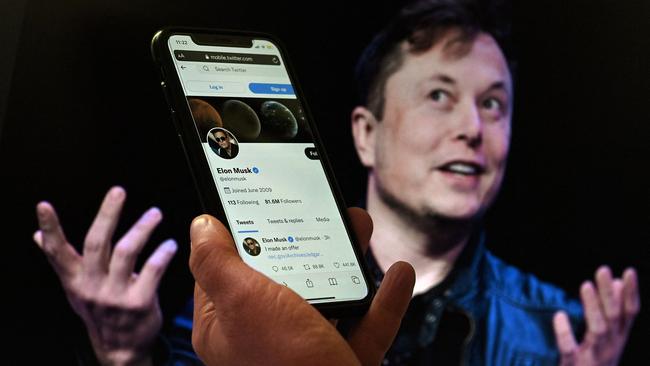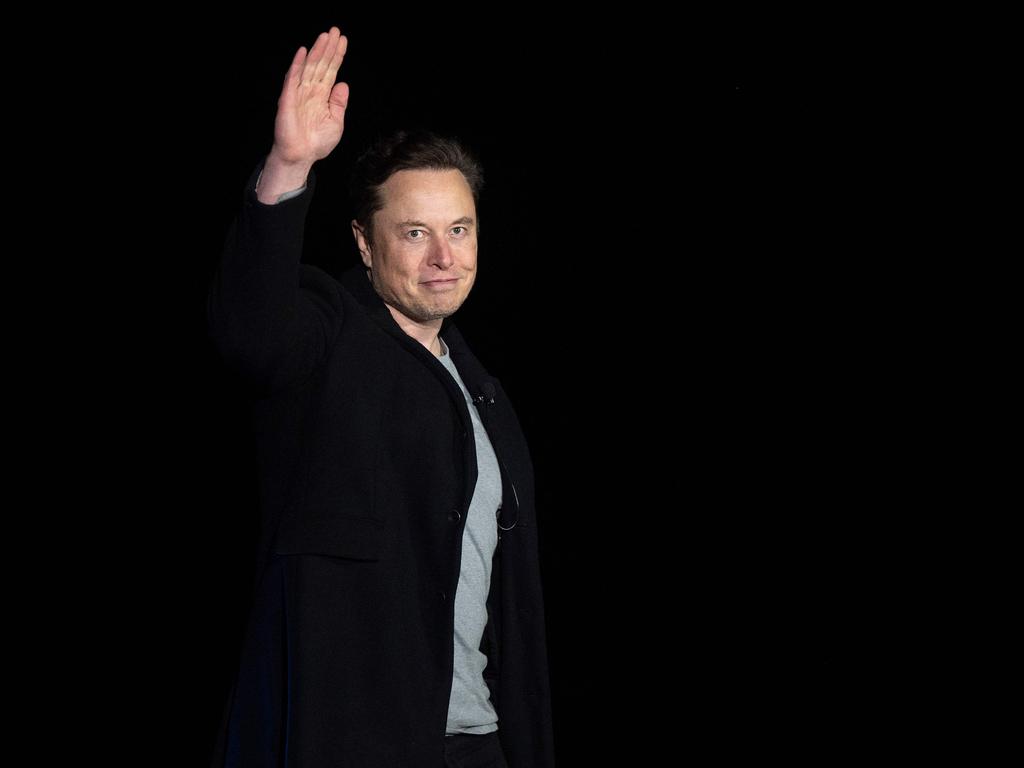‘Future of civilisation’: Elon Musk’s free speech goal in Twitter bid
The world’s richest man says his move to buy Twitter wasn’t financially-motivated, declaring it was for the ‘future of civilisation’.
Elon Musk, the world’s richest man, said his bid to buy social media giant Twitter was motivated by upholding the principle of free speech for the “future of civilisation”, and not making money, declaring he was “obsessed with the truth”.
A few hours after launching a $US43bn ($58bn) bid to buy the entirety of Twitter on Thursday morning (Friday AEST), the South African-born billionaire and Tesla founder said he had a “plan B” should the Twitter board reject his offer, conceding he was “not sure” he could acquire it, even if he “could technically afford it”.
“It’s very important for there to be an inclusive arena for free speech … Twitter has become the de factor town square so it’s important (that there is) the reality and perception that they are able to speak freely within the bounds of the law,” he said, interviewed at a TED conference in Vancouver a few hours after details of his proposal emerged.
Mr Musk, 50, whose net wealth exceeds $US230bn, ended weeks of speculation about his intentions, after accepting then declining to take a seat on the Twitter board which followed Mr Musk’s surprise purchase of 9 per cent of Twitter last week and weeks of criticism of the San Francisco social media platform over its speech policies.
“This isn’t a way to make money … my strong sense is that having a public platform that is maximally trusted and broadly inclusive is extremely important to the future of civilisation. I don’t care about the economics at all,” he added.
Mr Musk said he would allow users to edit their tweets for a short period after posting, eliminate “bot armies”, and end what he called “black box … behind the scenes manipulation” of tweets that allowed Twitter to automatically, or manually, promote, demote and censor tweets and accounts.
“I think, this can be quite dangerous,” Mr Musk added. “It’s important to the function of democracy, of the US as a free country, and others and to help freedom in the world more broadly.”
Mr Musk’s buyout bid, which has reportedly caused significant emotional stress among Twitter’s staff fearful of a wide ranging censorship rollback, valued the company at $US54.20 a share, around a 20 per cent premium to where the shares were trading in New York on Thursday.
“Twitter needs to be transformed as a private company,” Mr Musk had written in his formal proposal to take over Twitter. “Twitter has extraordinary potential. I will unlock it.”
Mr Musk said he wanted to retain as many other shareholders “as is allowed by the law, around 2000 or so” if he succeeded in taking the company private, and (in tweet after the interview) that it would be “utterly indefensible” for the Twitter board “not to put this offer to a shareholder vote”.

Saudi Arabia’s Kingdom Holding Company, which currently owns a little over 5 per cent of Twitter, said on Thursday it would reject the offer. Under US law more than half of Twitter’s shareholders would need to support the buyout for it to succeed.
Mr Musk’s bid attracted a deluge of praise and condemnation from journalists, politicians and commentators, exercised by the potential impact of wholesale changes to Twitter’s speech rules, which last year saw former president Donald Trump permanently suspended in the wake of the January 6th riots.
Republican Congressman Jim Jordan said the bid was “great”.
“This is the public square today … this is where we have debate in our culture and country today so let’s have someone in charge who actually respects first amendment and free speech,” he said.
Max Boot, a prominent columnist at the Washington Post, reflecting a common view among Democrat-aligned journalists, said for instance he was “frightened by the impact on society and politics if Elon Musk acquires Twitter”, calling for “more content moderation, not less”.
In recent years the social media platform, which founder Jack Dorsey left last year, has frozen or deleted the accounts of doctors, journalists, politicians, from author Naomi Wolf to pop star Nicki Minaj, for transgressing its “hate speech” and “misinformation” policies, which includes voicing criticism of Covid-19 vaccines, lockdowns, masks or jokes about trans people.
“We would want to err if in doubt (on the side of) letting the speech exist; if it’s a grey area let the tweet exist,” Mr Musk told the audience, to sporadic rounds of applause. “I personally won’t be in there editing tweets.”
The Covid-19 pandemic has fuelled a growing and increasingly vicious debate about free speech online after Twitter, Google and Facebook began to censor posts and individuals that were critical of the US public health authorities.
In March Twitter suspended satirical online newspaper The Babylon Bee for naming Rachel Levine – a transgender four-star admiral who Joe Biden last year appointed an assistant secretary for health – as “man of the year” last month. USA Today, a mainstream national newspaper, had earlier named her one of its “women of the year”.
Mr Musk accused Twitter of “fundamentally undermining democracy”, suggesting a “new platform” might be needed after polling his 80 million plus Twitters users on whether Twitter “rigorously adhered” to the principle of free speech. More than 70 per cent of over two million responses voted “no”.
Mr Musk also spoke about his childhood, Tesla’s near collapse during its early days – its share price has surged from around $US85 at the start of 2020 to almost $US1000 – and his difficult relationship with the US Securities and Exchange Commission, whom he called “bastards”.
“Truth matters to me pathologically … An obsession with truth is why I studied physics, because physics attempts to understand the truth of the universe,” he said. “I was quite depressed about the meaning of life as teenager … I got into German philosophers, which is not wise if you’re a young teenager I have to say.”








To join the conversation, please log in. Don't have an account? Register
Join the conversation, you are commenting as Logout